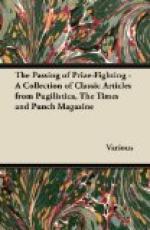After which harmony will be restored by means of the tuning-knife.
* * * * *
“It did one good, on entering the Queen’s Hall last night, to find every seat in the building, even to those at the back of the rostrum, occupied by the London Symphony Orchestra.”—Evening Paper.
An audience is often so distracting.
* * * * *
[Illustration: Fortune-Teller (to client). “A DARK MAN HAS BEEN HOVERING ABOUT YOUR PATH FOR THE LAST MONTH.”
Client. “OH, THAT MUST BE THE AGENT WHO’S BEEN WORRYING ME TO INSURE MY LIFE.”]
* * * * *
=THE MOTHER-IN-LAW MYSTERY.=
In a provincial paper I find the following passage:—
“Counsel stated that the prisoner’s mother was in court. Later he informed the Judge that he had made a mistake; it was the prisoner’s mother-in-law. A general laugh throughout the court followed this ‘correction.’”
We have here in a nutshell the case for traditional communal humour, and once again we are set to wondering why—except possibly to allay some whimsical twinges of self-respect—dramatists ever try to invent new jokes at all. Even more are we set to wondering why this particular joke never fails.
In the present case the injustice done to an honourable class of women—that is to say, those who provide lovers with their loves (for that is how these relationships begin)—was the greater because no doubt, when the laughter had subsided a little, every eye sought for the lady in question. Normally we have not the opportunity of visualising the butt at all. It is enough that she should be mentioned. Nor would any grotesque details in her costume or physiognomy make the joke appreciably better. It requires no such assistance; it is rich enough without them; to possess a married daughter is all that is necessary to cause gusts of joyful mirth.
That it is not the lady herself who is funny could—no matter how Gothic her figure—be proved in a moment by placing her in the witness-box and asking her to state her relationship to the prisoner’s wife. She would say, “I am her mother,” and nothing would happen. But if the question were, “What is your relationship to the prisoner?” and she replied, “I am his mother-in-law,” sides would split. Similarly one can imagine that if the husband’s reply to the counsel’s question, “Who was with you?” had been, “My wife was with me,” there would have been no risible reaction whatever; but if the reply had been, “My wife’s mother was with me,” the place would have been convulsed. Of course the true artist in effect would never say, “My wife’s mother,” but “My mother-in-law.” It is the “in-law” that is so exquisitely amusing and irresistible.
But both would be the same person: the gravest thing on earth, it might be, in every other respect—even sad and dignified—but ludicrous because her daughter happened to have found a husband.




